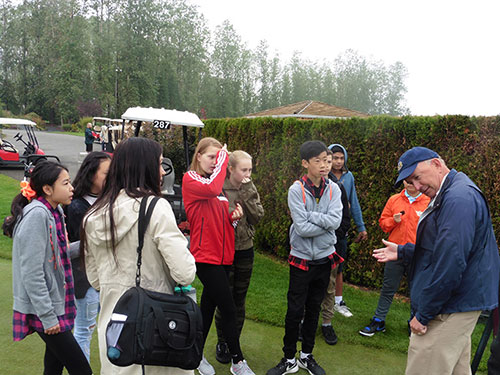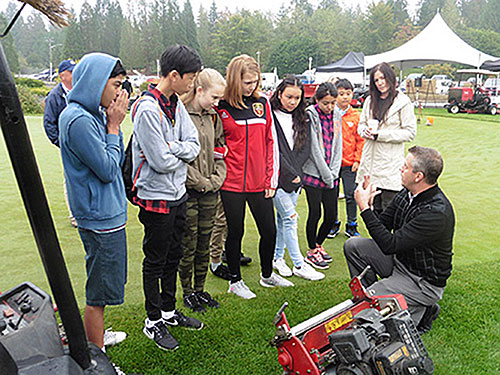
USGA Agronomist Larry Gilhuly Talks To Kids From Pitt River Middle School During A First Green ‘Links As Labs’ Program At Redwoods Golf Course Demonstration – Image Credit Alfie Lau
by Alfie Lau
Up until now a field trip to a golf course would usually mean swinging some clubs and learning some golf etiquette. No longer. As part of the First Green ‘Links as Labs’ program, 24 wide-eyed Grade 7 and 8 students from Pitt River Middle School stepped off a school bus and onto a real-life science lab, otherwise known as The Redwoods Golf Course in Langley, B.C.
The Western Canada Turfgrass Association (WCTA), in partnership with the First Green Foundation launched the first program in Canada that brings environmental education to grade 5 and up students using golf courses as environmental learning labs. “This unique program gets kids connected with golf, not just as a sport, but also as a place where you can learn about the environment,” said Jerry Rousseau, executive director of the WCTA “We’re working on getting superintendents at golf courses interested in this program so that we can launch it anywhere there’s a golf course.”
First Green is an innovative environmental education outreach program using golf courses as environmental learning labs, allowing students to perform hands-on experiments and tests, all within the focus of their school’s environmental science curriculum. For example, kids can work in outdoor labs led by the golf course superintendent, doing such activities as testing water quality, collecting soil samples, identifying plants, doing math activities and working with local issues such as streambed or owl-nest restoration programs.
Stan Kazymerchyk of Kwantlen Polytechnic University’s Turf Maintenance program, was showing one group of students how maintaining a golf course involves everything from knowing how to calculate how much fertilizer to use to knowing what chemicals are more harmful to the environment.
Kazymerchyk was getting some assistance from a horticulture expert, who showed the students that a golf course can be a living garden, with everything from fruits, vegetables and herbs being grown on a golf course and able to be used in the restaurant or simply for beautification purposes.

Jamie Robb From The Capilano G&CC Talks To Kids From Pitt River Middle School During A First Green ‘Links As Labs’ Program At Redwoods Golf Course Demonstration – Image Credit Alfie Lau
At another station, the United States Golf Association’s Larry Gilhuly, an agronomist who works with courses throughout the Pacific Northwest, was showing his group of kids the environmental benefits of golf courses. “The grasses on a golf course are some of the best producers of oxygen we have,” said Gilhuly, who has been involved with First Green initiatives in the Pacific Northwest for many years. Gilhuly’s high-profile position has allowed him to get more publicity for these educational initiatives.
Gilhuly was the USGA’s point man for the 2015 US Open at Chambers Bay, just outside of Seattle, and the First Green was featured in a public service announcement which ran throughout the summer on all FOX Network broadcasts of USGA championships. This tremendous level of attention introduced First Green to more 200 million viewers of the USGA broadcasts. “I would not be involved with this if I didn’t think it was a great program that allowed kids to learn and was a lot of fun as well,” said Gilhuly. “I drove 160 miles to be here because I believe it’s important that kids see how connected their environmental studies and golf courses can be.”
During Gilhuly’s presentation, conducted alongside Capilano Golf & Country Club’s superintendent Jamie Robb, the duo were able to show the students how deep grass roots can grow and how something as simple as a pebble can we worth $1,000. “We cut grass with some pretty expensive mowers,” said Gilhuly. “If we don’t know what’s in those grasses we cut, and rocks get into our mowers, they can cause thousands of dollars in damage. That’s why we need to know everything we can about our golf course environment.”
For Mary Polak, the MLA for Langley and the BC Minister of Environment, it was important to see how this new program can be beneficial in so many different ways. “There’s lots to see and do at a golf course,” Polak told the young students. “Take note that golf courses are places where you can learn so much and have an amazing career.”
“The best part about First Green is that it can happen at any golf course and there are golf courses in practically every community in our province,” stated WCTA President Trevor Smith. “This makes the program accessible to kids everywhere, not just those in larger centres.” Smith said an added benefit for the program is the kids see how many different careers are indeed available at a golf course. Whether it’s working on the grounds crew, or in the golf shop or in the hospitality side of the business, golf courses are a vital part of the local economy.
Holding the event at The Redwoods was easy because their golf course superintendent, Peter Szarka, is a big believer. “We have 180 acres here, we have bird sanctuaries, we have a wonderful place for kids to learn about the environment,” said Szarka. “It’s a lot more than just cutting grass. It’s about engaging with our community to show them we are so much more than just a golf course.”
The First Green program is based on the STEM learning concept, an acronym for science, technology, engineering and math. The inaugural event held on Canadian soil, and the first international First Green event ever, took place in May 2014 at the Vancouver Golf Club. Closer to home, Elizabeth Buckley School in Victoria, BC, has shown interest in First Green as they are going with a ‘STEAM’ program (the added “A” stands for arts). Last summer, the First Green Foundation formalized its relationship with the WCTA through a Memorandum of Understanding (MOU) signed August 24, 2015 after a successful train-the trainer event held at the Redwoods.
The MOU comes after more than a year of the two group’s efforts introducing Western Canadian golf course superintendents to this unique program. “First Green will do very well in Canada because of WCTA members’ commitment to sharing the benefits of golf courses for communities,” said Karen Armstead, First Green executive director. “We are excited to see First Green flourish in this environment.”
As part of the MOU, First Green will train WCTA staff and directors in the program, participate in WCTA demo events, provide an annual report and offer support resources to help promote the First Green program. WCTA will promote the First Green program in Western Canada. It will also provide updates to First Green on local programs and training, and assist First Green in collecting survey feedback information during field trips and share this information with First Green.
Rousseau said there is still a lot of work to be done, namely working with local teachers, school boards and school districts to show them the direct educational benefits of being involved in the program. Rousseau was happy to see Polak attend the demonstration and the WCTA has already engaged with the BC Ministry of Education to see what more they can do to get the program up and running in the near future.
Supporters of First Green include the USGA, Washington State Golf Association, Pacific Northwest Golf Association, the Northwest Turfgrass Association, Western Washington Golf Course Superintendents Association, local golf clubs, public and private school systems, and individual contributors who assist the organization through monetary grants and participation in field trips.
For more information, go to www.thefirstgreen.org.






